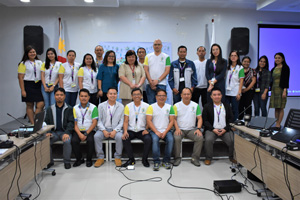
As an intensive training-workshop on IP protection and management, the IP Master Class is composed of six modules to be conducted for 18 days spread over for five months (February to June 2018).
The Association of Patent Agent Qualifying Examination (PAQE) Professionals, Inc. (APP) developed the training curriculum with PAQE’s pool of experts serving as resource persons and training facilitators for the whole duration of the Master Class.
Composed of PAQE’s passers, the APP is the only association of certified patent agents in the country, which is administered by the European Patent Office and the Intellectual Property Office of the Philippines (IPOPHL).
The six-module Master Class demonstrates the whole patent application flow through hands-on prior art searches, actual claim drafting, filing application, substantive examination request, responding to Formality Examination Reports (FER), up to the administration of a mock exam for patent agent aspirants.
Module 1 covers actual invention spotting, prior art search, and technology disclosure drafting. As a foundation course, Module 1 also covers the types of IPs, the IP system and policy environment, and IP relevance to the academe. Prior art search reports and invention disclosures form part of the module’s outputs.
For Module 2, the trainees are coached on writing independent and dependent claims and finalizing patent/utility model applications. As a final activity, the participants are expected to do actual filing of applications and to have personal interaction with examiners at IPOPHL.
Meanwhile, Module 3 is facilitated through guided exercises on the analyses of prior art documents and invention disclosures. The mock exam for patent agent aspirants is administered in Module 4. Module 5 tackles the patent application requirements under the International Patent System, while Module 6 coaches the trainees on how to respond to FERs. Presentation of outputs by the trainees will be the final activity of the Master Class. Each participating agency is expected to file at least one patent or utility model application.
The trainees are selected technology transfer officers of the implementing agencies of the recently approved project on Enhancing and Operationalizing Intellectual Property Management and Business Development Office (IPM-BDO) in Consortia Member Agencies.
The project involves 10 consortia member agencies which include nine state universities and colleges (SUCs): Cavite State University (CVSU) (the overall coordinator), University of the Philippines Los Baños (UPLB), UP Visayas (UPV), Bataan Peninsula State University (BPSU), Central Luzon State University (CLSU), Capiz State University (CAPSU), Benguet State University (BSU), Bicol University (BU), and University of Southeastern Philippines (USeP). It also involves one R&D Institution, the Philippine Rice Research Institute (PhilRice). Five technology transfer staff from PCAARRD completes the list of trainees.
IPM-BDO aims to strengthen the capacities of selected SUCs and RDIs to effectively carry out their IP management and commercialization functions. IPM-BDOs are technology transfer offices that are envisioned to mirror the initiatives of the DOST-PCAARRD Innovation and Technology Center (DPITC).
The DPITC serves as a one-stop hub for technology owners and generators, investors, end users, and other stakeholders within the agriculture, aquatic and natural resources (AANR) innovation system.
Its activities include capability building to improve the IP management and entrepreneurship capability of consortia members/RDIs; networking and linkaging with key partners and service providers to hasten commercialization; business development and technical services (e.g. valuation, market research, valuation, etc.); funding support for IP management and pre-commercialization activities; and technology marketing and business acceleration.
IP is the next game changer in the country’s arena of AANR R&D and technology transfer. IP rights (IPR) do not only protect the invention but also provide market protection to innovators, generate income from royalties, make products available at lower cost, create jobs along the commercialization process, and generate taxes from companies and employees. However, much work is still needed to protect and commercialize our AANR innovations. Capacity building activities such as the IP Master Class is a small part of the Council’s initiative in creating a vision of a competitive AANR innovation system.
